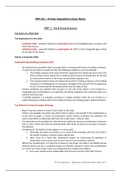Summary
Summary LPC Private Acquisitions Revision Notes 2021 (High Distinction - 90%)
- Course
- Institution
Notes on Private Acquisitions for the LPC at BPP University. These revision notes summarise key SGS course content in a way that is easy to understand and helped me achieve 90% on the PA exam.
[Show more]



